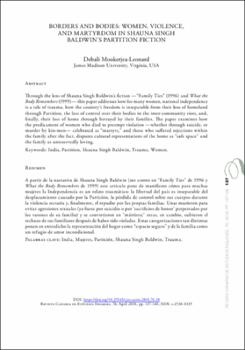Borders and Bodies: Women, Violence, and Martyrdom in Shauna Singh Baldwin’s Partition Fiction
Fecha
2018Resumen
A partir de la narrativa de Shauna Singh Baldwin (me centro en “Family Ties” de 1996 y What the Body Remembers de 1999) este artículo pone de manifiesto cómo para muchas mujeres la Independencia es un relato traumático: la libertad del país es inseparable del desplazamiento causado por la Partición, la pérdida de control sobre sus cuerpos durante la violencia sectaria y, finalmente, el repudio por las propias familias. Unas murieron para evitar agresiones sexuales (ya fuese por suicidio o por ‘sacrificios de honor’ perpetrados por los varones de su familia) y se convirtieron en “mártires;” otras, en cambio, sufrieron el rechazo de sus familiares después de haber sido violadas. Estas categorizaciones tan distintas ponen en entredicho la representación del hogar como “espacio seguro” y de la familia como un refugio de amor incondicional. Through the lens of Shauna Singh Baldwin’s fiction —“Family Ties” (1996) and What the Body Remembers (1999)— this paper addresses how for many women, national independence is a tale of trauma, how the country’s freedom is inseparable from their loss of homeland through Partition, the loss of control over their bodies in the inter-community riots, and, finally, their loss of home through betrayal by their families. The paper examines how the predicament of women who died to preempt violation —whether through suicide, or murder by kin-men— celebrated as “martyrs,” and those who suffered rejections within the family after the fact, disputes cultural representations of the home as “safe space” and the family as unreservedly loving.





